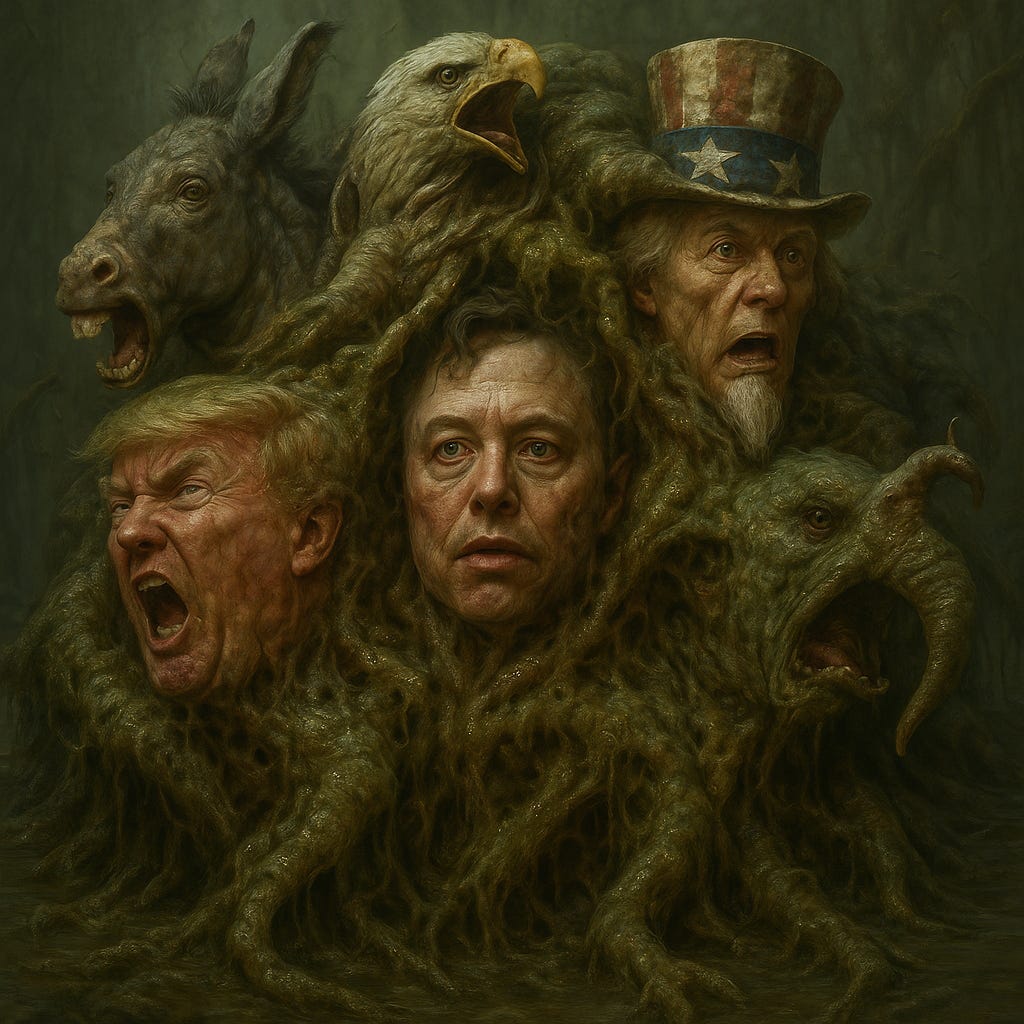SwampThing 3.0 - on the parties politic
“You either die a Thing, or live long enough to become a Swamp…”
In early 2025, Elon Musk did what few of his wealth-tier ever actually attempt: he stepped directly into government, not simply as a donor or a silent partner, but as an operator. Appointed to lead the newly formed Department of Government Efficiency (DOGE) under President Trump, Musk entered with a characteristically bold mandate; to cut waste, modernize systems, and bring the logic of engineering to a system powered by something closer to palm-reading.
The effort was, at first (probably) well-intentioned, and the general instinct wasn’t necessarily wrong either. American bureaucracy has become a bloated, self-replicating organism whose primary function seems to be avoiding accountability while growing in size. Musk’s mandate (strip it down, clean it up, make it run) had appeal.
But the execution was naive. Government cannot simply “be streamlined” like a manufacturing line or debugged like a Tesla firmware update. It is not a machine. It is an ancient, amorphous construct built of rituals, power plays, redundant protocols, moral contradictions, and the scar tissue of a thousand previous reforms. Musk seemed to be trying to bring logic into a realm that had long since stopped pretending to be logical.
DOGE moved quickly and loudly. Procurement systems were frozen. USAID’s labyrinthine spending came under scrutiny. DEI programs were suspended or purged entirely. The department reported billions in “projected savings,” and for a moment it looked to many like something might actually shift.
But then came the consequences.
Federal payment systems buckled. Natural resource protections scrapped. FAA snd NOAA practically shaken upside-down for lunch money. Veterans experienced benefits interruptions. Regulatory agencies stalled. Several whistleblowers reported that DOGE’s operations were being directed by under-qualified interns and ideological loyalists with little understanding of federal process. Entire communities (already hanging by a thread) got lost in the bureaucratic aftershock. A post-mortem review described DOGE as “a chainsaw applied to a system that required microsurgery.”
It was reckless in some ways, destructive in others, and dangerific at a scale that no one inside the beltway seemed to fully grasp until the damage was already done. But it did, admittedly, for all its blunders, also publicly expose something undeniable: there is rot in the walls. Government systems are not just inefficient; they are structurally vulnerable, susceptible to hacking, data manipulation, and internal sabotage. In revealing how badly things could go, DOGE inadvertently proved just how broken things already are.
Musk’s tenure in DC ended in conflict. A fallout with Trump over bloated spending sparked a public rupture. Musk resigned, blistered the administration on his way out, and now, seemingly done with trying to fix the system from within, he’s proposing to go around it entirely.
Enter: The America Party.
A new political party. A clean slate. A fresh banner.
And absolutely, positively, the wrong move.
America doesn’t need another political party. It needs to delete the very idea of parties from its operating system.
Since 1856, when the two-party structure hardened into place, over 1,200 third-party candidates have run for president. Not one has won. A few have played spoiler. Most have vanished into footnotes. Even the most successful (Teddy Roosevelt in 1912, Ross Perot in 1992) only proved that the structure can absorb shock and return to form, unshaken.
A third party is not a solution. It’s a side quest.
And the core problem isn’t that we have the wrong parties. It’s that we have parties at all.
Parties are loyalty machines. They sort people into boxes, reduce complexity to slogans, and punish deviation. They reward outrage and incentivize conformity. Their true allegiance is not to voters, but to their own continued relevance. They exist to survive, not to evolve.
Musk’s idea - to form a “better” party - is a natural impulse for someone disillusioned by the inner workings of the system. But it is still a misunderstanding of what the system actually is. The party structure is not a communications problem. It’s a power structure problem. Adding a new tent to the circus doesn’t change the fact that the clowns are still in charge.
If we genuinely want to address the disease, not just the symptoms, here’s part of what it looks like:
Abolish party labels from ballots. Make voters evaluate candidates as individuals, not jerseys.
Publicly fund elections. Ban private donations over a modest limit. If a candidate insists on taking big money, require visible sponsorship patches. If you’re owned, wear it.
Shorten the campaign season. Elections should be finite events, not full-time performances.
Mandate transparency. Publish negotiation records. Record legislative sessions. Expose the sausage-making.
End first-past-the-post voting. Implement ranked-choice or approval voting to reward cooperation and reduce strategic self-censorship.
Impose term limits. No more permanent careers in Congress. Public service should be a chapter, not a dynasty.
End lifetime Supreme Court appointments. Ten-year terms. No more oracles in robes reigning till death, disconnected from the generation beneath them.
This isn’t a partisan wish list. It’s a return to first principles: representation, accountability, and truth in governance.
The two-party system is not a debate. It is a stage play, endlessly re-staged for each cycle, with new villains and new slogans but the same plot, and the same ending. It isn’t governance. It’s content.
Starting yet another “third party” in that environment doesn’t challenge the system. It feeds it.
Musk saw the flaws. He tried to confront them. His solutions were unfortunately clumsy and potentially catastrophic, but the impulse behind them wasn’t wrong.
What IS wrong; is thinking the solution lies in simply re-joining the ritual in a new costume.
The practical and patriotic path forward is to stop letting our government be run perpetually by two filthy mascots fighting to the death on our pitchers mound.


